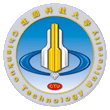Chienkuo Technology University, Changhua 建國科技大學
Contact Information
OIA Director
Yi‐Juen Chen (Iris Chen)
陳怡君
Tel: 04‐711‐1111 ext.1720
Email: [email protected]
Address: No. 1, Jie Shou North Road, Changhua City 彰化市介壽北路一號
Hours: Mon ~ Fri 8am - 5pm
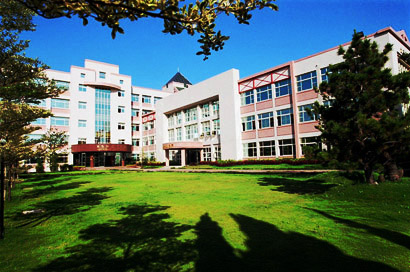
With four colleges, fifteen departments and five graduate institutes Chien Kuo Technology University Campus is a leader in the technology field, attracting students from around the world. Chien Kuo Technology University provides an outstanding opportunity for overseas students.
Chien Kuo Technology University offers full scholarships for international students and free Chinese classes. In addition to cutting‐edge research in all fields and free Chinese classes, Chien Kuo Technology University offers international students Culture Classes, so they can not only master their fields of endeavor, and Chinese, but understand the culture they are in by assessing it with leading academics from around the country.
Furthermore, international students are allowed to have their materials & tests offered in English! So, while getting the chance to master their Chinese, students will not have to be concerned with their academic progress: tests and materials can be provided entirely in English.
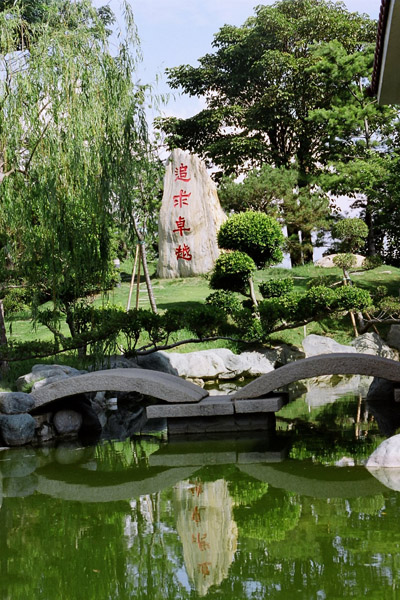
This provides a unique dual benefit for students: the school allows international students from English-speaking countries the opportunity to dramatically accelerate their Chinese skills AND…students from non‐English speaking countries can have the DUAL benefit of solidifying their English skills while learning Chinese at the same time!
In addition to Chien Kuo Technology University’s academic strengths international students find the setting of the school – in Changhua, nestled next to the Bagua Mountains – to be both warm and welcoming, cool & green. The smaller setting of Chien Kuo Technology University ensures that overseas students will not get lost in the metropolitan shuffle. The school’s assigning of professors to help assist each international student makes the transition to Chien Kuo Technology University seem seamless and stress-free. Many students find themselves eager to not only continue with their studies, but to make Chien Kuo Technology University their academic home, pursuing not only undergraduate or master’s degrees, but doctoral degrees as well.
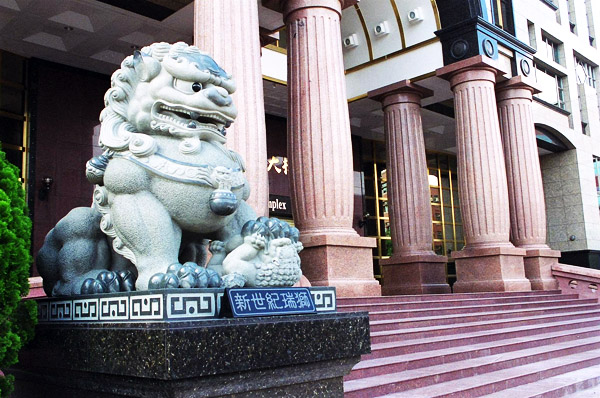
We took the time to meet with the Director of International Affairs Ms. Yi‐Juen Chen (Iris Chen) 陳怡君, Professor Fei‐ Hsuan Liao 廖妃絢, American Student Shawn Michael Storey 石海文, Korean student Andria Velazquez 朴鄭恩– and Morrocan student Amine Benna 月 安茗, who all took time to explain what Chien Kuo Technology University means to them and why international students should strongly consider the Changhua‐located campus of this leading school for every level of study.
Chien Kuo University OIA Director Ms. Yi-Juen Chen (Iris Chen) 陳怡君
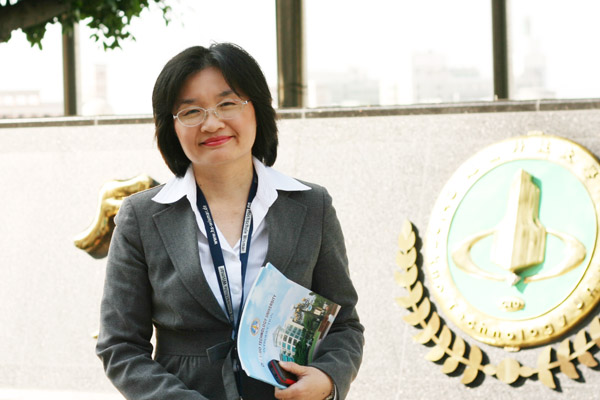
Chien Kuo Technology University…is a four‐year university. We are very strong in the engineering college. We have five departments and we have also graduate institutes. So, it’s very good for students who are seeking graduate or undergraduate study at the university.
Important information about the study at our university: we do waive tuition fees for foreign students…. For the first time they won’t have to pay the tuition fee. In the second year we will check their academic record: if they reached, say 80 points, an average of 80 points in the first year they won’t have to pay the tuition fee. And they just have to pay half of the dormitory charge…
Are there opportunities for students to make some money?
It’s also possible for them to find jobs on the campus: whether, for example, as a teaching assistant or a part-time job at our English café. So that they can finance their study here.
Thus students might have a chance to study all free – the whole undergraduate or graduate school?
Yes. And it’s quite possible for them to finance their whole study here.
Chien Kuo also provides Chinese…
Free Chinese courses: we do.
And, well most courses here at Chien Kuo Technology University are taught in Chinese but if the foreign students attend [classes] which are taught in Chinese the professors will provide English materials for them. And it’s possible for them to do the exams in English. And, when they begin the study here they can attend our Mandarin courses free of charge. So, it’s possible for them to attend [class] and at the same time they can attend our Mandarin courses to learn necessary phrases, Chinese phrases for everyday living.
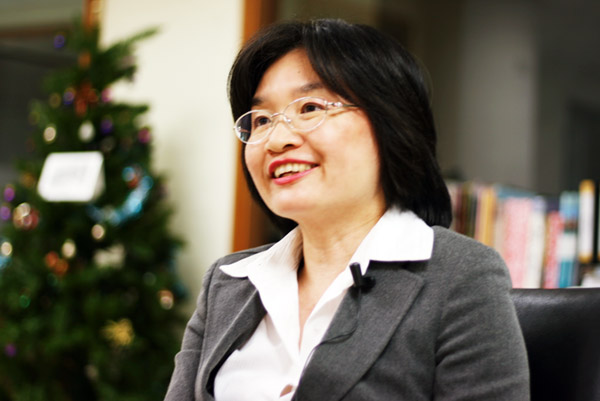
Can you also tell us about the culture…
Culture courses! That’s also offered free! We have professors who can offer foreign students courses about geography, history and culture in Taiwan and those courses will be taught in English and they are specifically for foreign students at our university.
And also I know Chien Kuo all is a really supportive environment even if you cannot speak Chinese – you will have some kind of English assistant, teachers or faculty member…
Yes. We do assign professors who can assist students in English. And we…also have persons who are good in [other] foreign languages. For example, we have persons here who can speak German, French, Korean, Japanese – so, students with those languages as mother tongue can come over here and they can really get good help from us.
Also I heard they can take English tests: their tests will be in English?
Yes. For example for the mid‐term or final examination – they can take all the exams in English. So, even though the courses are taught in Chinese they can take the exams in English. And, I believe in this way they can really begin the courses with ease.
Please can you tell us a bit about the school's location?
Here in mid‐Taiwan we have really nice weather throughout the whole year. For example, in the winter you do have sunny days and with shiny blue skies and in summer the weather is really nice too; it’s not so hot as in southern Taiwan. I personally believe that here in mid‐Taiwan you have the best living environment in Taiwan. And Changhua with population of about 260,000 it’s very convenient for living. It’s not very crowded and you do have good restaurants here. You have nice shopping stores. And [since] it is located in Mid‐Taiwan it’s very convenient for you to go to Taipei or Kaohsiung -- they are all within one hour’s ride through the high speed railway. It’s not so expensive like in Taipei, Kaohsiung. People here are absolutely friendly. You know, the good experience for our foreign students when they live in the dormitory with our students they are treated to really like brothers or sisters of our students. So, this is about the big environment of Changhua City.
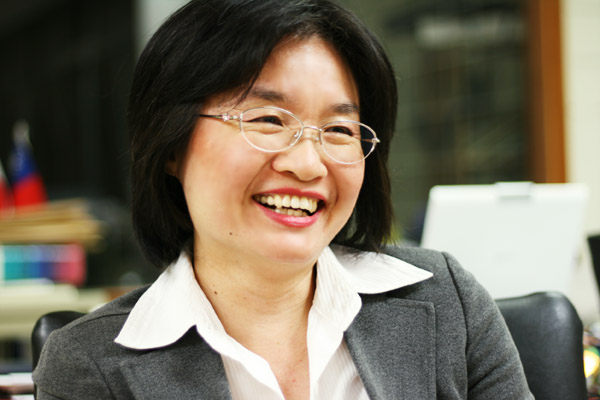
So, I heard that there is great support from Chien Kuo University to international students. I will also be interested in what students here at Chien Kuo think about international students. Do they have some kind of association to help international students? Or, they want to know them? Or some kind of student group on campus to make friends with them, to help them, to support them?
Yes. We do have some students at our department of applied foreign languages who can help the foreign students. And they can guide them, for example, to the supermarkets, the department stores and they can guide them to know the streets – those are really trained students who know how to introduce the city to the foreign students. And especially here in my office: it’s…dedicated to foreign students; we do help them a lot – we help them: solve them problems with the visa, with the application to the study here. So, and all the persons here can speak English – and we do speak [many other] languages….
Is there anything else you want to tell us? Why foreign should students should come to Chien Kuo to study?
Well, all the foreign students are treated very nicely and personally here. I know that in some big universities they have quite many foreign students and therefore each foreign students can be just a name on a long list in the university. But, here we know each foreign student and we help them personally so for each…
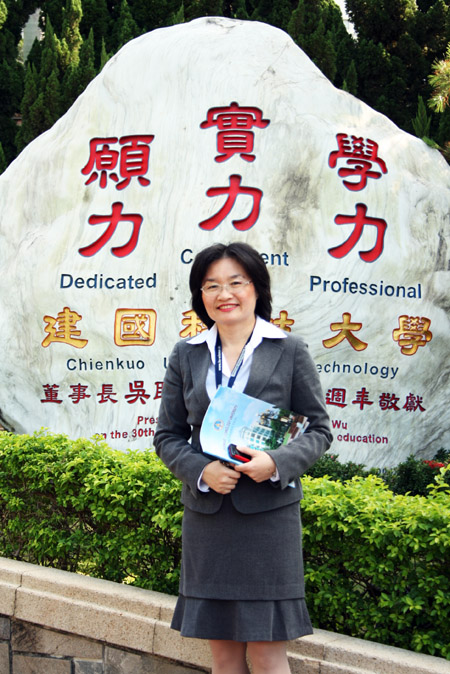
Very individualized.
That’s right! So, foreign students here can really get very personal assistance here on campus.
How about once they graduate? Do you also have some kind of assistance? To help them to plan their future: academic futures or helping them to find a job?
For this area of the professors in each department can help them really well. For example, currently our students, the student Amine (from Morocco), and he has help from us to find connections with German companies so that he can have connections with them and he can [consider] doing his master’s thesis with those companies and so that he can also help some German companies to do some things here in Taiwan.
If international students are interested in Chien Kuo what do you suggest them to do?
Firstly: they can contact me, [email protected], or my office [+886-4-711-1111 ext.1720: Mon ~ Fri, 8am to 5pm; In Taiwan: 04-711-1111 ext.1720] and do some first depth consultation [insert phone number and links here] and we can clarify at first step what they want to study here and if we can also check if we have suitable offers for them, both for the courses or for the everyday living – they want to rent the house, or so on: we can help them. So, the first step is also to contact with my office and we can help them through all the steps including application and then registration and then their study up to graduation.
So, what do you think students need to prepare in advance of coming to CKU?
Well, they can in fact check our web page first to get enough information and if they have any questions and please contact us [email protected] or my office [+886-4-711-1111 ext.1720: Mon ~ Fri, 8am to 5pm; In Taiwan: 04-711-1111 ext.1720] and we will be very happy to answer all their questions and in a very quick way.
Professor Fei- Hsuan Liao 廖妃絢
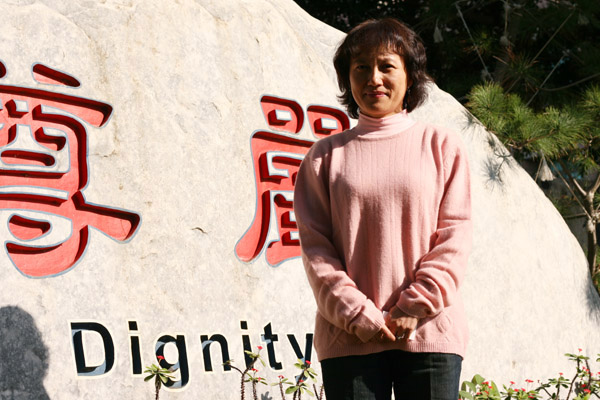
Chien Kuo Technology University welcomes all foreign students...to come to Chien Kuo for study. And [we] will provide Chinese classes for all these students [at appropriate levels for the incoming students]. And all the teachers are quite well-experienced Chinese language teachers. We have worked with western…colleges for…years and the programs go very well. We have some exchange programs that we send students to each other’s colleges or universities. We provide foreign students accommodations – free accommodations – and also Chinese classes. And also we [can] give them a job at the English café [to help them add to their finances in a fun way].
Foreign students in Changhua have a good opportunity to experience the rich local culture because Changhua is situated in between Taichung and Chunghwa County and it is, yes, it is a small town but the way to Taichung, the urban city, is not far. And also it is a quiet town…students can have a very peaceful and wonderful life here. We also provide some local tours for the foreign students. And we have some historical towns near Changhua City – I mean Lu Kang鹿港…
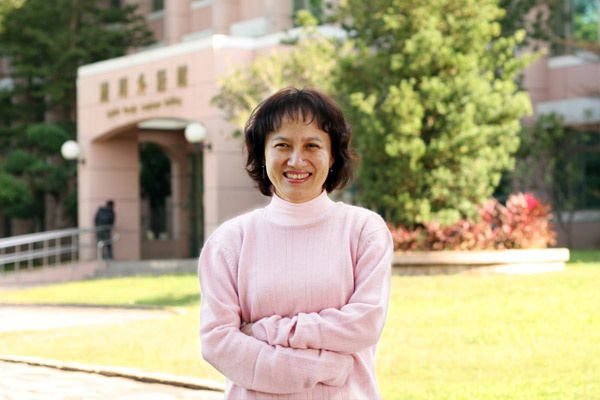
I know Lu Kang has lots and lots of Temples.
Yet, quite a lot of Temples, ancient Temples. It is of historical town and it has a great view along the sea and also the Temples – if you go to the Temples – you can find a very wonderful history of each temple which stayed in that town for almost over 300 years.
How far to go to…
It takes only 40 minutes to Lu Kang
Bus ride or scooter ride?
Bus ride. Yes, it is not far. And, and [Lu Kang] is a small town. What I like most is the dedicated dessert [Phoenix Eye Cake] produced in that town it is very delicious, believe me. And almost all the foreign students love that dessert....
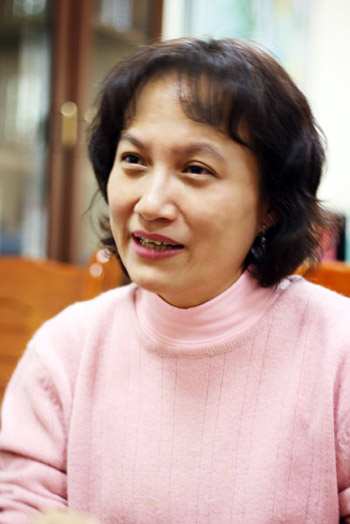
Can you tell us some more about the foreign students who study in this department: what the department provides them and what we can, what kind of strengths that can attract foreign students to study here?
Apart from the Chinese classes that we can provide for all the foreign students…English is the major of this department and so for students or from other countries some as Asian countries, we can also provide good English classes for [them]. And I think the teachers in this department are all experienced language teachers so we use quite current methodology, textbooks, education materials to teach English language. So I think, what is also proven…is that the foreign students can learn, have a very good environment to learn English. We also have one or two…native speakers of English who can help us teach these classes. We think if we can provide more…English learning experience for our students from the native speakers that is good. And so that is why American students or [other native English-speaking] students can assist us in this field. So, we…can arrange that they can have a teaching assistant job in this department – that won’t be any problem.
So, they will get paid?
They will get paid, yes no doubt! I think that this is a global village now, right? So I think that will be…a major objective of this department: to have more international students in this department, not only local students – from America, from other countries, from Asian countries.
About welcoming these international students: what do you think…
We basically will invite the students for all grades to attend a welcoming party and I will introduce all the teachers to the foreign students. And, we have some – of course – something to eat, something to have fun in the party. And I also, sometimes, if the president or the vice‐president is free, I will also invite them to meet the foreign students. Because I think that’s necessary for them to know this is a big family, the leader of the family, so…
So, would you like to say anything else, any other words?
Just “Welcome to Chien Kuo!”.
Shawn Michael Storey 石海文
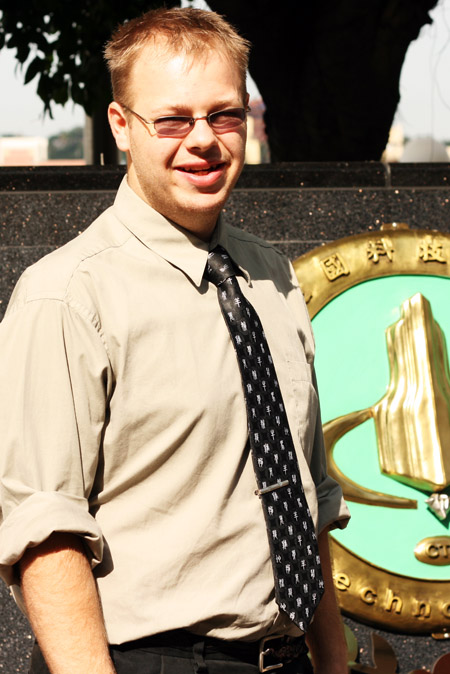
I am 20 years old and I am currently in Taiwan at Chien Kuo university. I am studying in the AFL Dept here at Chien Kuo. Here at Chien Kuo I have a very busy schedule. I am in four Chinese classes a week – I’m in four Chinese classes, and so that’s 8 hours of Chinese a week. And then I’m also teaching six English classes a week. And, I am also working at the coffee shop for 10 hours a week.
Where are you from? Tell me about your parents? Why are you in Asia?
I’m currently from Nebraska – it’s in the middle of the United States. I’m a senior at Wayne State college in northeast Nebraska. I am studying education and my two education endorsements are in Spanish and speech communications, with a special endorsement in English as a Second Language. I have one more year to finish at Wayne State before I graduate and so currently I’m finishing classes at Wayne State while I’m here in Taiwan.
In Nebraska I live with my parents, my mom and my father. I have one older brother and he is married and he has a daughter and he lives in Nebraska as well. There in Nebraska if he is a correctional officer, he works for the prison system in Nebraska.
You were born in Japan. Can you tell us something about that?
This is not my first time to Asia. I was actually born in Okinawa, Japan. My parents were both active military; they were in the United States Navy. And, so, I was born in Okinawa. I lived in Okinawa for nine months and then afterwards my family moved to different locations in Asia: they moved to South Korea and they also moved to the Philippines and after about a year and ½, two years we moved to Hawaii. I stayed in Hawaii a little over a year as a child and then we move to California. I stayed in Southern California for most of my primary school and then when I was 14 years old my parents retired from the military and moved to Nebraska. My mom is originally from Nebraska. We moved to Nebraska and I went to high school throughout Nebraska. And now I go to college in the northeast Nebraska as well.
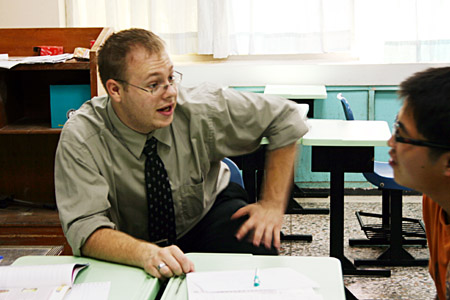
You just said you work in Chien Kuo; can you tell us more about your working here in the coffee shop?
Alright. With the...I do have Chinese classes – like I said I have 8 hours of Chinese classes a week, that’s with three different teachers. One class – there all in the mornings – one is on Tuesday one is on Wednesday and then the ones on Thursday and Friday mornings are the same teacher. And I enjoy my Chinese classes a lot. I enjoy the experience of having three different teachers because each teacher teaches differently…. One class is a little more focused on writing, one class is a little more focused on oral presentations in Chinese and the other class is more focused on grammar and the rules of Chinese grammar and how sentence structure is made in Chinese.
Then I also work in the coffeehouse: I work Monday through Friday for about 2 to 3 hours each day depending on which day. At the coffee shop my job is to actually implement English…. Part of my program coming here to Chien Kuo was to implement English as much as I could outside the classroom. So, while I’m working in the coffee shop my job is to talk to students and to try to encourage talking in English. When someone tries ordering a coffee [I might ask] “Would you like to buy coffee? What type of coffee? Would you like a big coffee or small coffee? Would you like a hot coffee or cold coffee with ice?” And then, when no one wanted to order coffee and people were just sitting, eating lunch I would actually go and sit down with the students and communicate with them in English and promote as much English [communication] as possible while the students were in their natural environment outside of the classroom.
How have the students been responding?
At first the students were very shy and they were very shocked…“What is this American doing here?”. But then, as I was here for a month, a month and half, the students started to get to know me, they started doing things with me and then they really enjoyed it. And so the students really started enjoying me speaking English with them a lot and it was really fun. I implemented magic – I tried using that as an icebreaker. I do a lot of magic as a hobby. I have a friend an American who’s a professional magician and so I would do a lot of magic as kind of icebreakers for people, and just to get people to laugh and to have fun and then I would start teaching English without them really knowing they were being taught English.
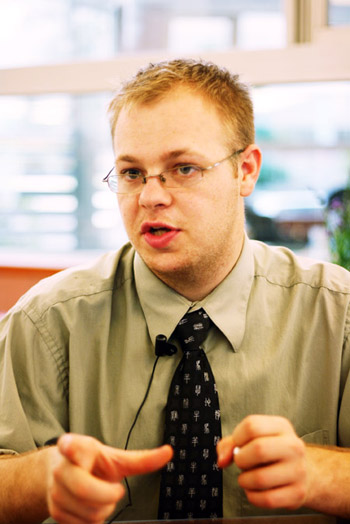
So, can you tell us your teaching experience here? Is that the first time you have ever taught Asians?
Yes, this is my first time actually teaching in Asia and I have six English classes that I assist with, I am a T. A. (because I am an undergraduate – and so I’m not an official teacher – I’m actually a teacher’s assistant.) But, I talked with a lot of the teachers and they know that I have had teaching experience – and I enjoy [it] and I’m a teaching major. So, they actually let me take three classes on my own. So, three of the classes I actually teach pretty much myself. I am allowed to write my own lesson plans, get my own curriculum and actually implement as much as I want to in the class. And so they’ve given me a lot of freedom to actually work with classes and I really enjoyed it.
The other three classes change every week. They’ll change different classes and so I will actually be assisting professors in that way. A professor will be teaching and I will help them implement a native English speaker into the class. I will do a lot of reading. I’ll also do a lot of speaking and all implement American culture into the class. I will talk about, like, traveling in America. I’ll talk about American weather, American holidays. While being here in Taiwan we have gone through the holiday[s] of Halloween, Thanksgiving and now Christmas and New Year’s. And so, for all of the classes, I’ve given presentations and talked about what we do in America for Halloween, Thanksgiving and Christmas – and why we do the things we do.
How’s your learning so far in Chien Kuo? And why did you choose Taiwan?
I’ve learned a lot here in Chung‐Hwa. I’ve learned a lot about Asian culture and I’ve learned a lot about Taiwanese culture is specifically. I have, like I said, I have studied Japanese culture because, especially since I was born there I’ve had an interest about Japanese and I have found out that there’s a huge difference between Japanese culture and Taiwanese culture. There’s a lot of Japanese influence as well. Because of the history of Taiwan I’ve learned a lot of that – like I’ve seen, I see the differences but I also see the similarities with the Japanese culture as well. So I really enjoyed that. So I’ve really learned a lot. And then, in the classes – I’ve always, um, I actually started learning Chinese before I came here. I was enrolled in Chinese class before I knew I was coming to Taiwan and so I was studying Chinese a whole month before I came to Taiwan.
So you liked Taiwan because it’s kind of a combination between Japan and Taiwan?
Because, yeah, it’s a very good combination between Japanese and Chinese cultures. I’ve seen a lot of, like – the food: there’s a lot of Japanese influence in the food. The food here in Taiwan is very different because you see things that are Japanese influenced and Chinese influenced and it kind of makes its own style of food. You’ll see a lot of, like, the fan twan飯糰, the sushi – well, yeah, they’ll have, like, a Taiwanese twist to them. They’re not, like, the sushi you get in Japan – it’s a little bit different. It’s more…they use a lot more Chinese ingredients and they have the, it has the Taiwanese taste – it’s Taiwanese, it’s definitely different.
Those are all just observational, what I’ve learned by just observing the culture and living here. But I’ve also learned a lot in the classes. Here at Chien Kuo they’ve given me [Chinese] Culture classes: I’ve received 2 hours of culture classes, twice a week. So, 4 hours a week, and we would talk about different types of culture here in Taiwan and different subjects.
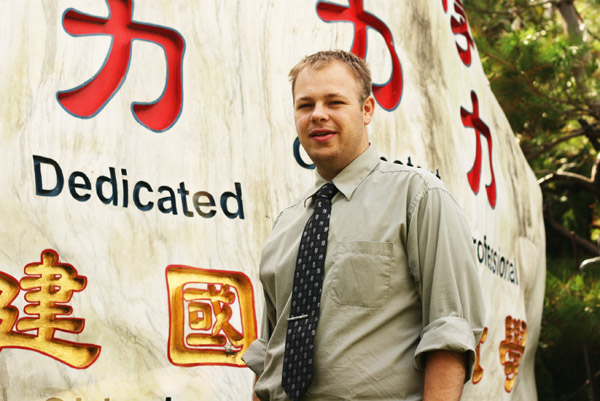
Can you tell me about the culture class?
Every week it was a different topic. We, the first week, we talked about traveling in Taiwan…
Were the classes one on one, people teaching a one on one or…
It would be of classroom setting. There would be maybe two or three people. It was open for any international student. So we had myself, there was also a German exchange student, a student from Morocco. There were several students from Korea, there’s one student from Bolivia. I think over 100 students from mainland China. So, those classes were offered to any international student, and they were free.
The classes were all in English?
Correct. And then the presenter would present, in English…about a topic in Taiwan, and the topics would range…the first one [was about] traveling in Taiwan – different tourist locations. One would be about the…history [of Taiwan] … We also learned about Chinese opera and the traditional Chinese and opera and how it’s different… We’ve learned about Taiwanese music. We had a specialist…
Pop music?
Traditional Chinese music.
What is traditional Chinese music?
Well, it was…music from the Han people and Hakka. There’s Hakka music and Holo河洛 music and we’ve learned about the traditional Chinese music and the sounds and the instruments that were used. And the differences between the Holo music and the Hakka music. And we had a music specialist come in…and he actually performed traditional instruments for us – it was very interesting.
Have you thought about staying in Taiwan?
I have thought about staying in Taiwan. It’s really wonderful, I love teaching here. There’s a lot of teaching opportunities here in Taiwan for English teachers but I have, I have to go back to my university because I have one year left. I’m a senior and still have to get a teaching certificate…. I have one more semester to finish and then I have a whole semester of student teaching where I have to go to a secondary high school and actually teach for a whole semester. And then the state of Nebraska will give me a teaching certificate.
Andria Velazquez 朴鄭恩
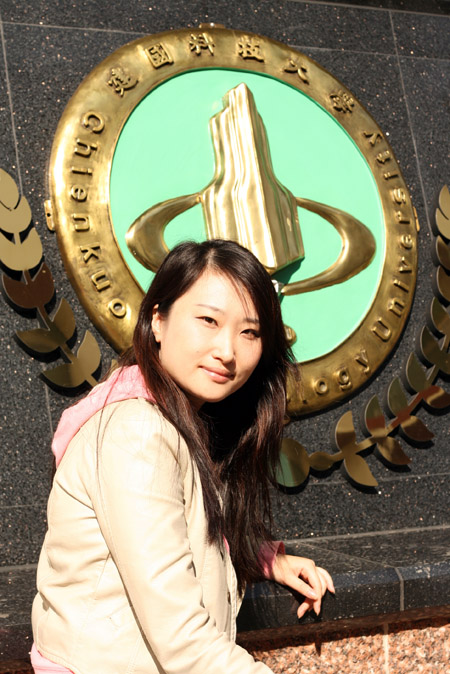
My English name is Andria Velazquez and my Chinese name is 朴鄭恩. My Korean name is Ak Tong Un. I'm 29 years old. In Korea and my major was Chinese. I studied Chinese for two years. At Chung Cheong University in Cheongju, South Korea.
Why did you come to NCKTU?
My old school and Chien Kuo Technology University are sisters schools. I heard if I [went to Shanghai for further study ] I should start from first year… [and that to graduate] is very difficult. Also, Chien Kuo Technology University gives foreign students scholarships. Also, they, they – if I went to China then I could study Chinese as my major [but here at Chien Kuo Technology University] I discovered I can study both English and Chinese…not so bad because I can catch both.
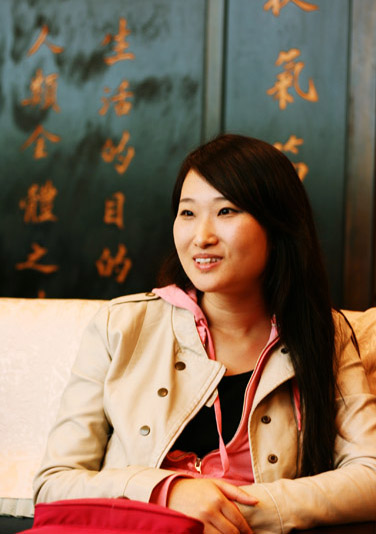
So you can have another language ability?
Yes, yes. I think my English speaking is not so bad, but my writing is really bad. So, nowadays, I’m studying about grammar things, writing things a lot….
Tell us about your family. Did you meet your husband in Taiwan?
In Korea. He’s an English teacher.
He was an English teacher at that time?
Yes. Now, also he’s [continuing as] an English teacher in Changhua. He [had] been in Korea about four years and we got married in 2007, 2008.
Because you told me at first you thought about going to Shanghai…
Yes. Shanghai or Beijing…. But I heard many times from other people…you need to think about graduating, too. To enter is easy but graduating is difficult....
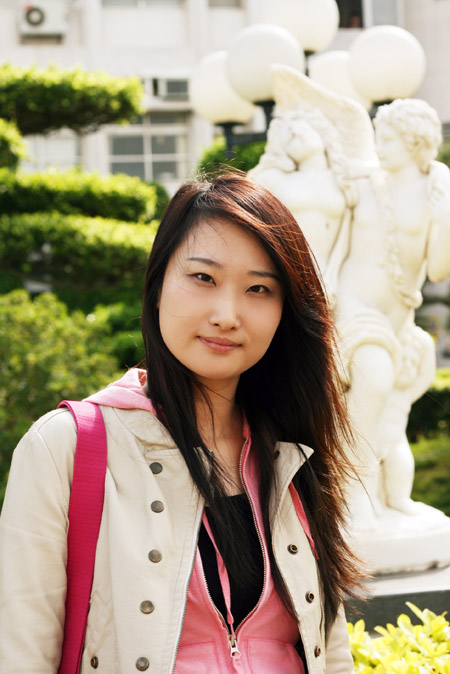
Why study Chinese?
I want to be a translator in America…
So you want to be an interpreter not just writing…
No, no, no, no, no. For tourists, for tourists or business people.
So, like tour guide?
No, not to tour guide.
After I learned Chinese I thought that “Oh…I have learned this so I want to use it.” [At first] I wanted, I wanted to work at the hotel in Las Vegas. I thought about it a lot. I heard [that] the hotel there they, they – how can I say, how can I say in English? Sometimes people are not treated quite so well…. So, my friends suggested to me “You can do better work so….
So what do you think of what you have learned so far? Can that help?
A lot! Getting better, getting better: my Chinese is getting better.
Amine Benna 月安茗
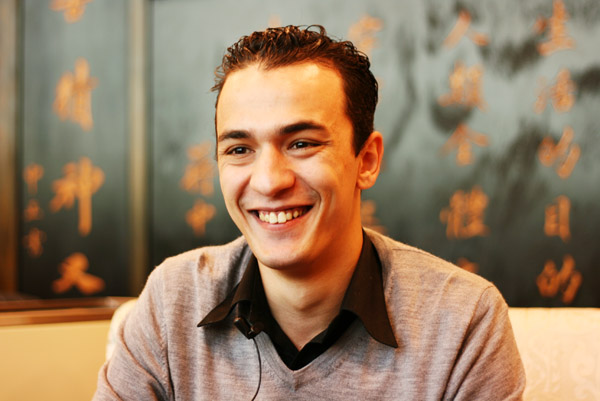
My name is bar now I mean golly. I’m 24 years old. I’m from Morocco. Morocco is in North Africa and I have been in Germany for five years for studying mechanical engineering. And I graduated with, like, a bachelor’s of engineering [majoring in] mechanical engineering in Germany. And after wanted to get my master’s and my opportunity before was to go to America or Canada, because I want to have an international career and to graduate from another country so that I can have two diplomas from two different countries [to demonstrate] that I also have international ability.
And so, why I am here in Asia, in Taiwan? Because when I was in Germany in our dormitory I saw Asian friends and in the city, and I find the Asian culture very interesting because if you see an Asian person [they are often so peacefully stoic] you don’t know how he feels – if he feels good if he’s not. And also in Asia you have a big culture, in the food: that’s what we see there in the TV. And for me, like a mechanical engineering student – all the products I search, if I see something: it’s from Taiwan or China or Korea. So, I was every time thinking why, why they are so – why did they develop so much?
Like Acer, TSMC, Toyota, Honda…
Like, companies, like Acer for example. Yeah, they are all from Asia. Just the little chip, you find it inside a computer or machines…. And they are [often the lowest price]. So, and I was thinking “That will be good, that would be very interesting to come to study there.” But, the, the best point is that I met one Taiwanese girl – she come to my university as an exchange student and I was responsible to take her because I was in the [student] parliament of my university. I was responsible for helping a lot of students. And, so, I was responsible to take her, to show her the university, the dormitories, the supermarkets: everything that she needed to know. So, when she told me about Chien Kuo Technology University and about how life is in Taiwan, about the cost of living and everything. And, when I came here, she help me so much. She came to pick me up from the airport, to find a room…. Helped me with everything.
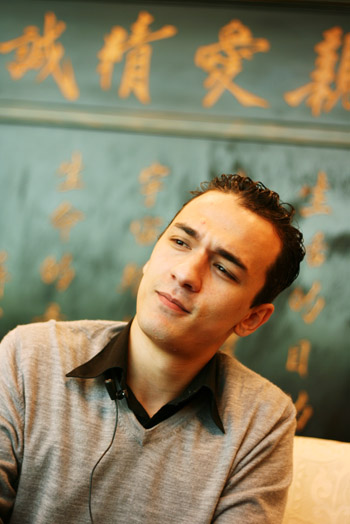
So, chien still studies here now?
Yeah. She’s studies in the language building, language department. In Chien Kuo university.
Maybe she’s your classmate?
[Nods yes]
Oh my god! Tell her to read all the nice things you have said!
She’s a really nice girl.
Can you tell me something about your father? Your father is a congressional representative? You said your father had suggested that you study in Korea.
My father is a political… He works in politics. So, he has been in a lot of countries around the world. And so he has been in Korea and he wanted to send me to study there. But, at that time, I was very young so that it was not possible. But, now, I have the opportunity. So, the day I called him to say “Dad, I want to go to get my master’s degree in Taiwan.” The answer was he told me “This is the best thing you can do!”
He said that? Why?
I don’t know…. I can just remember when I called him. Now, when I decided, because my dad let me make my own decisions because I am now 24, so, old enough. But he asks that I consult with him. To say “That’s what I want to do. What do you think?” And so, and so when I said “Dad, I want to go to Taiwan to get my master’s degree”. He said “This is the best thing you can do! Do that.”
Wow! That’s very impressive.
“Do that.”, yeah. He said that. Yeah, because he was in Korea, Japan, Thailand, Taiwan….
So, he had been to Taiwan, too! What was his experience when he was here?
In Taiwan he was in Taipei just for a few days so…
Because of political issues or…
I don’t know exactly. I don’t know exactly.
He’s happy that you’re here?
Yeah. Yeah; he’s really happy. He’s really happy.
How have your studies gone so far?
My classes are very interesting.
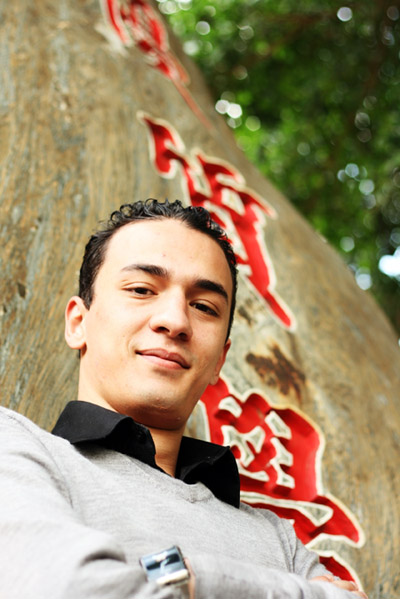
You got your undergraduate degree in Germany and you came Taiwan for your graduate work. Can you explain that.
Yeah! Because with the master’s you will just specialize. The fundamentals you have done it already for the bachelor degree. So, I have, I learned from Germany…I can speak very fluent German. Also Arabic, French, English and I hope Chinese will be my fifth language that I can speak. So, if I were to get my master’s degree in Germany I could just work in Germany. So, I will work just in Germany and I don’t want to stay whole my life in Germany.
Why? Because you’re the kind of person who really admires technology?
Yeah but I am also the type of person who loves my country too much. So…in my future I will want to have my company.
Oh, your own company?
Yeah my own company. But, in Morocco. But, I will love to, for example, come to Taiwan to stay two or three months; go to Germany to stay one or two months. But, definitely I want that my kids will be born in Morocco and I – my home is Morocco. You know, so…
You want to go back home to donate yourself to make your country better and better.
Maybe in 10 years or in 20 years. I don’t know when, but one day.
So you want to learn as much as you can from the whole world…
From the world, yeah.
And how they succeed. How Germany succeeds how Taiwan succeeds how China succeeds how Korea succeeds and then bring those things back to Morocco? And to help your country. So I believe you’ll become the prime minister in the future.
In the future you want to establish your own business and then go back home to…
I have to stay in Chien Kuo maybe two years or more. After, if I find a job in Taiwan I would like to work here…
What kind of job are you looking for?
Like engineer…
So, you still want to be an engineer. What kind of engineer?
Mechanical engineer…
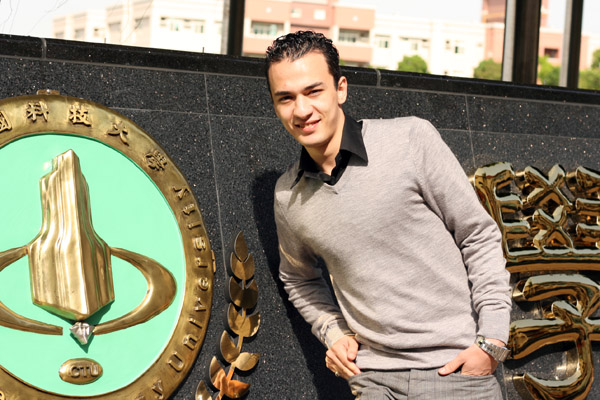
Mechanical engineer.
Yeah. Because I’m studying mechanical engineering.
But what kind of mechanics?
In Germany I made plastic products and now I am working on manufacturing…. [Also, I am interested in] representing some companies in Europe France or Germany. Because I have experience: before I…represented one company in Germany, one Taiwan company from Taichung.
What kind of business were they doing.
Hydraulic pullers.
Are you thinking of going to work for them?
No. Since being in Taiwan and I found one company in Germany. In four months they will send one person to Taiwan because they want to buy some products.
What’s your favorite class now?
Manufacturing.
Do you have anything else you’d like to add?
I’m happy to be here. I hope I will graduate with a good score.





